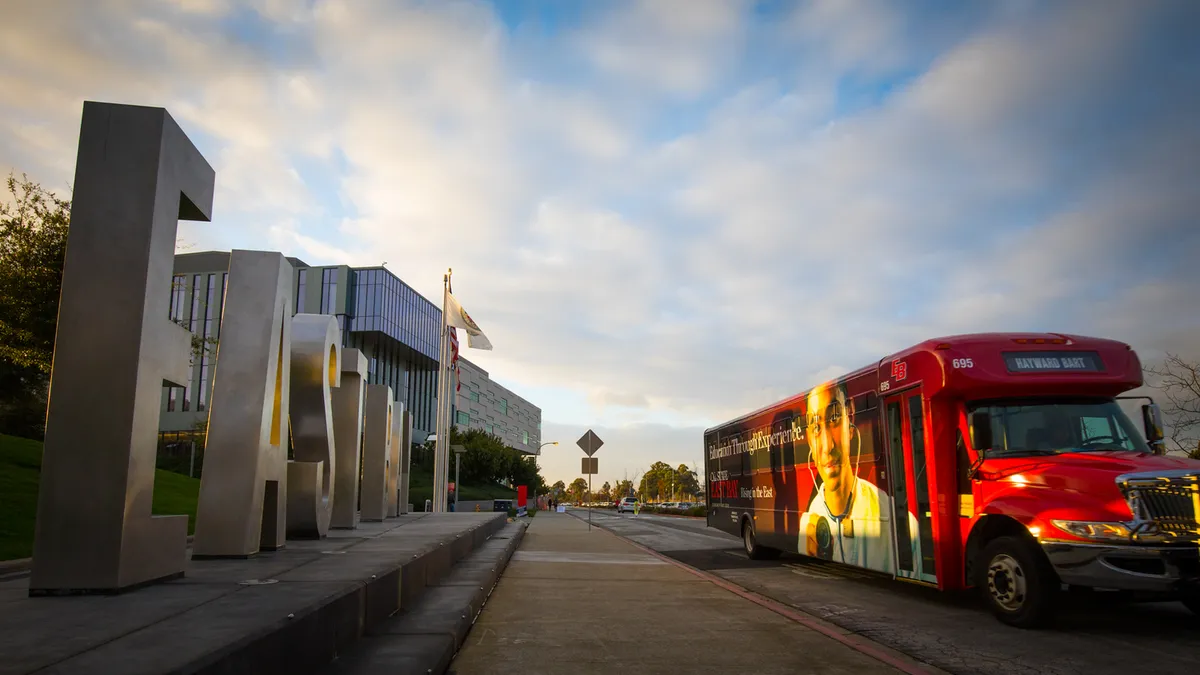Cathy Sandeen is the president of California State University, East Bay.
It's a commencement speech standard that never fails to generate rousing applause: "If you are the first in your family to earn a college degree, please stand."
I said those words in May at 16 separate in-person commencement ceremonies here at California State University, East Bay, where 64% of our students are first-generation students.
As a university president who is also a first-generation college graduate — and alumna of two California State University System campuses — of course I’m grateful for the opportunities my first degree has afforded me. At the same time, commencement season gives me the opportunity to more deeply reflect on how the first-generation experience today may have changed from my own undergraduate days, and how college leaders must respond to those changes.
Identity. Back in the ’70s, there was no name for us. In fact, I did not hear the term “first-generation college student” until around 2010. Imposter syndrome and other challenges are real for all first-generation students, as well as women and people of color. But today, first-generation identity is acknowledged more openly. That’s a positive change. The lingering feelings of shame and secrecy of the past may have dissipated somewhat for today’s first-generation students.
Better understanding of the special needs of first-generation students has led to many best practices to create a sense of community and belonging among these learners. Proactive academic advising and peer coaching are two examples. Our university also has published a series of handbooks for first-generation students, titled “You are Not Alone,” with first-person accounts from other first-generation students, staff and faculty.
Affordability. Public regional universities were truly affordable during my time. There was a middle class, and families could help support their students. Students could realistically work full-time over the summer to earn enough to pay for the next academic year. That is not the case today. Inflation-adjusted tuition costs for four-year public colleges have roughly tripled since the 1980s.
Today’s first-generation students come from diverse BIPOC backgrounds. They are also more likely to be from lower-income families than non-first-generation students. Despite greater financial aid options now compared to the ‘70s, many current first-generation students remain significantly challenged by the need to work multiple jobs and support families while struggling with housing and food insecurity — all factors that can affect persistence and degree attainment.
Basic needs support, food pantries, device loans and free open educational resources can all help the first-generation population.
Post-graduation. During my time as an undergraduate, career services consisted of a physical job posting bulletin board and perhaps a resume writing workshop. It’s no surprise such services have expanded along with the need for colleges and universities to report post-graduation earning metrics. A positive byproduct of this trend is recognizing that, upon graduation, first-generation students will become first-generation professionals or first-generation graduate students. Many universities are scaling their career exploration and support programs knowing that first-generation grads lack broader professional relationships, or social capital, of their non-first-generation peers. Career support is needed to propel success post-graduation.
Imposter syndrome. Some things have not changed. First-gen students operate out of their comfort zones every day. A litany of questions run through their head: "Do I belong here? Can I really be successful? Don’t ask a question, you might stand out." First-generation students are masters of code switching as they navigate between school and family. For instance, they may believe they must seem smart at school, but not too smart at home. Family achievement guilt may be exacerbated for students from cultures where family ties are emphasized. These deep emotional experiences persist over time — I am living proof — and will not be completely erased by providing enhanced first-generation student services. Empathy and understanding for the first-generation experience will remain a vital part of student success.
Economic mobility. This was and is indisputable: earning a bachelor’s degree is the key to economic mobility and stability for individuals, families and communities. Being the first to achieve this step remains a tremendous accomplishment even more so today than during my day — an accomplishment that is a societal good.
Our knowledge-based economy demands an educated workforce. More importantly, events of the past two years have highlighted the need for equitable opportunity for meaningful economic and social participation beyond the most privileged of our society. Being serious and intentional about supporting first-gen students can contribute to both goals — economic mobility and social justice.










